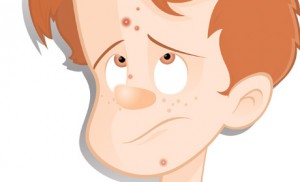It’s practically a rite of passage for a tween — waking up in the morning only to discover unsightly red bumps on the chin or forehead. About eight in 10 preteens and teens have acne, so at least kids know they’re not alone.
Early Onset
“Acne is an inflammatory disease, usually on the face and upper body,” says Anne Housholder, Clinical Instructor of Dermatology with UC Health. She explains that although acne can have multiple causes, most cases are driven by fluctuating hormones.
Acne can precede other signs of puberty, according to Housholder. With evidence suggesting that boys and girls are reaching puberty at earlier ages, it makes sense to think that younger children might start visiting a dermatologist’s office.
A 2011 study in Pediatric Dermatology found there has been a very slight decrease in the average age of children needing treatment for acne between the years 1979 and 2007. But a rise in younger children seeking acne treatment could also be linked to parents and doctors taking quicker action. According to the American Academy of Dermatology, acne that begins between 8 and 11 years of age may indicate more severe acne during the teenage years. Early treatment can help avoid that severity and any potential scarring, not to mention the blow to self-esteem that acne can wield.
Treatment
Every child is different, so what works for one may not be effective in another. Housholder advises parents to first bring up any concerns with their pediatrician, who may want to try a topical medication. Topical medicines containing benzoyl peroxide are often the most effective over-the-counter treatments for acne, and are safe for kids to use. In more severe cases, your pediatrician will likely refer you to a dermatologist who may prescribe a low-dose topical, or a short antibiotic course for more severe cases. Parents will play an important role in educating their children on how to use the medication, and to make sure that children stick to the treatment plan. It’s also critical to keep kids from picking or squeezing their pimples, according to Housholder, as that can lead to permanent scarring. Be sure to periodically re-evaluate treatment with your doctor to make sure it is continuing to work.
Things to Keep in Mind
Although there is some recent evidence that acne flares might be linked to foods with a high glycemic index, Housholder says, “Chocolate and french fries by themselves don’t cause acne.”
It’s also important for parents and kids to remember that acne is not a problem with cleanliness, so avoid over-scrubbing the face, since that can irritate the skin, making acne all the more noticeable. Instead, Housholder recommends gently washing the face once or twice a day with a mild soap, making it part of a nighttime routine. “We teach kids to brush their teeth at night, we can do the same thing with washing our faces.”





